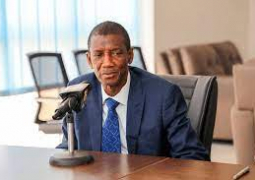The latest Corona Virus or COVID-19 (C-19 for brevity) descended on us like a thief in the night and turned the world on its head. Its spread has caused untold damages, ravaging communities and devastating societies. There are various theories as to where it hails from and its cause, but the focus of this article is the humanitarian and socio-economic crisis caused as a result of the virus and how strong social protection policies coupled with coherent, concerted internal as well as global effort can help alleviate some of the challenges focusing on SSA.
The outbreak of this potent virus not only threatens lives and livelihoods but also to reverse the human development advances made in the past decade.
As at writing this, the global numbers of C-19 cases stands at over 6 million with over 400,000 reported deaths. Furthermore, it is reported that the America’s have the highest number of cases or people affected by C-19 at over 3 million and about 180,000 deaths with Africa having the least number of at over 135,000 and the least number of deaths at over 3,000. Although a cure has not yet been discovered, work is underway and according the WHO DG “solidarity trials have begun to evaluate the safety and efficacy of four drugs and drug combinations against COVID”. It is worth noting that even though Africa has recorded the fewest number of cases and deaths the numbers are consistently rising albeit at a slower rate compared to other continents.
The continent of Africa has always been viewed as a basket case with a cap forever in hand begging for handouts. I can say that this myth has no merit and that the world could do with learning from the African experience on how to fight C-19. Hindsight they say is a great teacher. Armed with the lessons of Ebola, the continent of Africa even though was the last to feel the wrath of C-19, pulled itself up its bootstraps and got to work. Countries started by reducing the number of flights coming into their countries with some countries such as Uganda even deporting people who refused to adhere to the rules. Some countries like Sierra Leone mounted wash hand stations and ensured every one coming into the country had their temperature checked. They (African countries) also swiftly moved to close schools and borders and limit public gatherings. They also set aside some funds for C-19 related activities including the purchase of PPE's (in addition to what Jack Ma donated) and other sanitary products.
It is indeed heartening to know that with all the challenges the continent is faced with in the form of weak health systems, feeble institutions and poor infrastructure, when it came to one of the deadliest diseases ever recorded the continent became a force to be reckoned with. We had news pundits baffled, western leaders scratching their heads and even their own citizens applauding the approach the leaders have undertaken to curb the spread of the virus. Now as previously stated, there is much to be criticized when it comes to the continent but in the case of C-19, Africa has manifested great courage and leadership which should be celebrated.
A case in point is Senegal where the Institut Pasteur in Dakar, the first lab accredited by WHO for testing of C-19. The lab then trained 25 labs in the region with a lab in South Africa also training 18 more resulting in more than 30 labs in Africa trained in C-19 testing. Using its AIDS and Ebola experience Senegal developed an affordable testing kit worth only $1. We have also seen in Africa the spike in home-based manufacturing particularly of face masks and hand sanitizers. It has also seen a rapid development and improvements in digital services. Madagascar’s President also claimed to have developed a medicine for the C-19 which a few of his compatriots have commissioned (worth noting it has not been approved by WHO). However, while I commend leaders for the timely response and exhibiting the kind of leadership Africa has yearned for decades, I will be remiss if I don’t mention the deplorable state of our systems that has for decades made the citizens of Africa languishing in poverty. Paradoxically Africa is one of the poorest continents in the world despite being rich in both human and mineral resources. In fact, I read somewhere that there is a possibility that it is due to its youthful population that the country has the least number of C-19 cases as well as deaths.
It is not lost on us that when calamities occur it is the most poor and vulnerable that are disproportionately impacted. The shock of C-19 has not only resulted in food insecurity especially for households who were borderline poor and food insecure already but has also impacted community cohesion and gender-based violence. According to the ILO, the informal sector in SSA accounts for 41 percent of GDP and contributes significantly to economic growth and development. Besides that, it is what most households depend on for their livelihood. Therefore, measures instituted to curb the C-19 virus such as curfew and limiting of gatherings including places of business places undue burden on people engaged in trading even farming. Strong social protection policies in place to protect the most vulnerable segments of the society would’ve gone a long way in alleviating the sufferings of the poor and ensure that we aren’t caught off guard. Social protection can be defined as a set of policies developed by governments to protect the most vulnerable members of society and support them to become productive members of society. SP instruments include cash transfers and food transfers, public works programmes, fee waivers to name just a few. Utilising these instruments can help alleviate the sufferings of the most poor and vulnerable and can lead to the reduction of poverty as is the case in Brazil with the Bolsa Familia, Peru with the Juntos and many other countries. I am not implying that Social Protection is a panacea for poverty eradication, but numerous studies have shown the effectiveness of using social protection tools to empower the most vulnerable members of society and make them productive and tax paying members of society.
We cannot underestimate the importance of strong SP policies accompanied by implementable work plans backed by strong government institutions to help in the fight for poverty. We have already begun to see how the most poor and vulnerable are impacted by the C-19 and this negative trend is likely to continue for the foreseeable future and it is not going to ease anytime soon as countries have already started opening businesses and public places even though a vaccine has not yet been produced. There are also protests happening all over the world and there are reports that a second wave could be beckoning. However, we shouldn’t lose sight of the fact that this is a war on an “invisible enemy” and the only way we can come out on top is if we continue exercising caution and adhere to the protocols set forth by WHO.
Furthermore, Africa can use this moment as a lesson to not only develop new and refurbish existing systems including hospitals, schools etc to help in the fight against shocks that inevitably affect its most vulnerable populace.
Therefore, to answer the question if social protection can help empower people in the era of C-19 my response is a resounding yes if accompanied by strong institutions, clear and concise policies and strategies with political will as its bedrock.
Read Other Articles In Opinion





